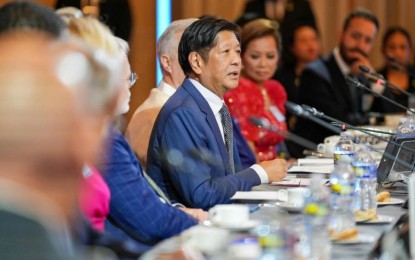
BUSINESS FORUM. President Ferdinand R. Marcos Jr. delivers a keynote address during the Philippines-United States Business Forum co-hosted by the US- Association of Southeast Asian Nations Business Council and the US Chamber of Commerce in Washington, D.C. on Saturday (April 13, 2024, PH time). In his speech, Marcos emphasized the need to forge a bilateral free trade agreement with the US and the revival of the Generalized System of Preferences Program. (Photo courtesy of PBBM official Facebook)
MANILA – President Ferdinand R. Marcos Jr. on Saturday (PH time) pushed for a bilateral free trade agreement (FTA) between the Philippines and the United States to achieve economic transformation and open more job opportunities.
There is a demand from both the US and the Philippines’ private sector for engagement in a bilateral free trade agreement, Marcos said in his keynote speech during the Philippine-US Business Forum in Washington, D.C.
“The benefits for concluding an FTA, together with critical minerals agreement between both our countries, will be transformative and will create new jobs, strengthen supply chains, establish new businesses, and upskill our workforce,” Marcos said.
Philippine Ambassador to the US Jose Manuel Romualdez on Thursday said the Philippines is eyeing an FTA with the US on cyberspace and digital technology, part of the two nations’ renewed interest to further enhance trade and economic cooperation.
Marcos also urged the US Congress to expedite the revival of the Generalized System of Preferences (GSP), one of the oldest US trade preferences programs.
“We appeal to the US Congress to fast-track the reauthorization of the US GSP program which has benefited beneficiary countries such as the Philippines,” he said, as he touted that the Philippines is a “major market for US products.”
The GSP Program, established in 1974, has granted duty-free treatment to exports of certain products by developing nations into the US. The products range from electronics and agricultural products.
The program expired in December 2020 despite legislative efforts to extend it.
Robust economy
Marcos trumpeted the Philippines’ strong post-pandemic economic recovery, being one of the fastest-growing economies in Asia.
“On the economy, I would like to share with you that for 2023, the Philippines achieved a 5.6 percent annual growth in GDP (gross domestic product) which outpaced other high-growth economies such as China, Vietnam, and Malaysia,” he said.
“Despite the recovery time needed to accelerate businesses coming out of the Covid-19 pandemic, we were able to either exceed or match the economic projections of multilateral organizations, such as the IMF (International Monetary Fund), the ASEAN+3 Macroeconomic Research Office, and the World Bank,” he added.
Marcos said the Philippines also saw a 28-percent surge in foreign direct investment (FDI) net inflows, reaching USD1 billion in November 2023 from USD820 million of net inflows recorded for the same month in 2022.
He noted that the Department of Trade and Industry-Board of Investments approved PHP1.26 trillion in investment projects in 2023, higher by 73 percent compared to the PHP729 billion registered in 2022.
Marcos also stressed that the US was Philippines’ fourth largest source of FDIs and third top trading partner in 2023.
“Over the years, the Philippines has acknowledged the significant contribution of the United States to our economic agenda,” he said. “This affirmation underscores the deepening ties between the United States and the Philippines as we are both committed to advancing our mutual goal of economic progress.”
Also in 2023, Marcos pointed out that semiconductors and integrated circuits were the Philippines’ biggest exports to the US, amounting to USD3.1 billion, or 23.3 percent of its total exports to the North American country.
"We are seeing expansions by US companies in the Philippines in this sector. So, with the assistance from the US government, through the International Technology Security and Innovation Fund managed by the US State Department, we can achieve our goal of producing 128,000 semiconductor engineers and technicians by 2028 as demanded by the industry,” Marcos said.
“So, with this collaboration, the Philippines will be able to support the US semiconductor industry not only in assembly, testing, and packaging but also in other segments of the supply chain such as in microchip design and in research and development.”
Marcos assured US investors of breakthrough policy reforms in the Philippines to attract more foreign participation in the businesses in the country.
During the US’ first Presidential Trade and Investment Mission to the Philippines in March, Commerce Secretary Gina Raimondo announced the American companies’ planned investment in the amount of at least USD1 billion in projects that will create educational and career opportunities for Filipinos. (PNA)
